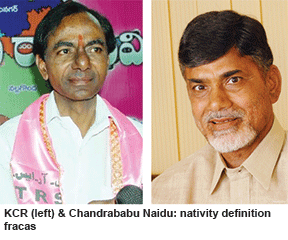THE DECADES-LONG STRUGGLE for the establishment of a separate Telangana state, which proponents wanted to be carved out of the state of Andhra Pradesh (pop. 84 million, estb. 1956), is over. On June 2, Telangana was officially promulgated as India’s 29th state after President Pranab Mukherjee gave his assent to the Andhra Pradesh Reorganisation Act, 2014, published in the official gazette of March 1. But after the long and bitter struggle of statehood for Telangana — erstwhile Andhra Pradesh is now the two separate states of Telengana (pop. 35 million) and residual Andhra Pradesh (pop. 49 million) — a new battle has been joined over apportionment of debt, power generation, and division of government bureaucrats and education services.
 A contentious issue in education which is reportedly receiving the top-level attention of the Telangana chief minister K. Chandrashekar Rao (KCR) and N. Chandrababu Naidu, his AP counterpart, is the fee reimbursement scheme (FRS), a popular welfare measure introduced in undivided AP by the late chief minister Dr. Y.S. Rajasekhara Reddy in 2008. Under the scheme, students from economically backward classes (EBCs) enrolled in professional education programmes — engineering, medicine, MBA, MCA and B.Ed — whose parents earn less than Rs.1 lakh per year, were reimbursed tuition fees and related expenses to the tune of Rs.52,000 annually by the state government. In 2012-13, the number of such EBC students aggregated 600,000, on whom the erstwhile state government expended Rs.3,000 crore.
A contentious issue in education which is reportedly receiving the top-level attention of the Telangana chief minister K. Chandrashekar Rao (KCR) and N. Chandrababu Naidu, his AP counterpart, is the fee reimbursement scheme (FRS), a popular welfare measure introduced in undivided AP by the late chief minister Dr. Y.S. Rajasekhara Reddy in 2008. Under the scheme, students from economically backward classes (EBCs) enrolled in professional education programmes — engineering, medicine, MBA, MCA and B.Ed — whose parents earn less than Rs.1 lakh per year, were reimbursed tuition fees and related expenses to the tune of Rs.52,000 annually by the state government. In 2012-13, the number of such EBC students aggregated 600,000, on whom the erstwhile state government expended Rs.3,000 crore.
Now following bifurcation of the former united state of Andhra Pradesh, the Telangana government has declined to pay the FRS of 39,000 EBC students of Andhra origin enrolled in colleges in Telangana, who as natives of united AP were entitled to FRS and admission into professional education institutions in the state (including Hyderabad) under the 85 percent quota reserved for natives. In undivided Andhra Pradesh, all students who had completed class VI-X schooling in the state were defined as natives.
Now the new Telangana government has proposed making the place of schooling of parents the criterion for determining nativity.
Therefore under the new definition, even students who have completed their schooling in Telangana but whose parents did not, would be considered ‘outsiders’ ineligible for FRS or inclusion in the 85 percent quota. This proposal of Telangana’s KCR government has deep implications as the great majority of undivided AP government and privately promoted professional colleges sprang up in what’s now Telangana during the past 58 years — the majority of them promoted by education entrepreneurs from what’s now residual Andhra Pradesh.
Therefore if the KCR government’s proposal to redefine nativity is translated into legislation, EBC students from the promoters’ own districts in coastal/residual AP won’t be eligible for FRS. Moreover the proposed redefinition of nativity is likely to impact students from residual AP who have written the former state’s EAMCET (engineering and medical common entrance examination) held on May 29. This year toppers from either state will be allowed to choose their preferred engineering and medical colleges. But if the KCR government’s nativity redefinition proposal is legislated, students from residual AP will be relegated to the 15 percent non-resident/management quota. This is certain to prove a contentious, divisive and volatile development.
The new Andhra Pradesh government has taken this issue to the governor urging him to intervene in the matter. Its contention is that the Telangana government’s proposal is in violation of the Andhra Pradesh Reorganisation Act, 2014 which states that both governments must maintain the status quo in education for the next ten years. “If the Telangana government issues formal orders in this respect, we will take legal action,” warns Andhra Pradesh social welfare minister Ravela Kishore Babu.
With new governments taking charge in two states of undivided Andhra Pradesh, instead of a happy ending, the pains of partition are just beginning.
Aruna Ravikumar (Hyderabad)